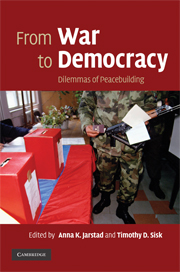Book contents
- Frontmatter
- Contents
- List of tables
- About the authors
- List of acronyms
- Acknowledgments
- Introduction
- Part I The perils of war-to-democracy transitions
- Part II The security context
- Part III The political process
- 4 Power sharing: former enemies in joint government
- 5 When rebels change their stripes: armed insurgents in post-war politics
- 6 Post-war elections: uncertain turning points of transition
- 7 Civil society in war-to-democracy transitions
- Part IV International engagement
- References
- Index
5 - When rebels change their stripes: armed insurgents in post-war politics
Published online by Cambridge University Press: 14 May 2010
- Frontmatter
- Contents
- List of tables
- About the authors
- List of acronyms
- Acknowledgments
- Introduction
- Part I The perils of war-to-democracy transitions
- Part II The security context
- Part III The political process
- 4 Power sharing: former enemies in joint government
- 5 When rebels change their stripes: armed insurgents in post-war politics
- 6 Post-war elections: uncertain turning points of transition
- 7 Civil society in war-to-democracy transitions
- Part IV International engagement
- References
- Index
Summary
Following the announcement of the final results of the legislative elections in Afghanistan in 2005, there was widespread concern that powerful warlords, former Mujahideen commanders, and Taliban strongmen had been elected to power in this war-ravaged country. The same year a peace agreement was signed between the Indonesian government and the guerillas in the province of Aceh, aimed at ending the prolonged civil war. The provisions of the agreement laid out the political and legal conditions for the establishment of local political parties and thus gave the amnestied rebel movement an opportunity, for the first time, to pursue its aims through the ballot box. In Nepal, the Maoist rebels agreed to join the interim government following the peace agreement in 2006. But what are the prospects for democratization and sustainable peace in war-scattered societies in which formerly armed insurgents emerge as politicians? The purpose of this chapter is to address this pivotal issue that is likely to be of great relevance to researchers and policymakers alike concerned with better understanding the conditions that facilitate and obstruct a transition to both peaceful and democratic politics in intrastate armed conflicts.
Because issues related to failed governance and the unequal distribution of political power and public goods often are at the core of the causes of civil wars, conflict resolution in these contexts frequently includes efforts to introduce, reintroduce, or reinforce political reforms aiming at a transition to democratic politics.
- Type
- Chapter
- Information
- From War to DemocracyDilemmas of Peacebuilding, pp. 134 - 156Publisher: Cambridge University PressPrint publication year: 2008
- 22
- Cited by



